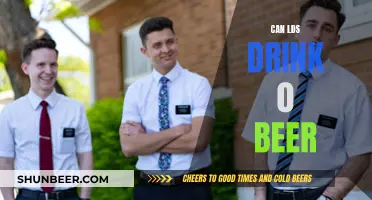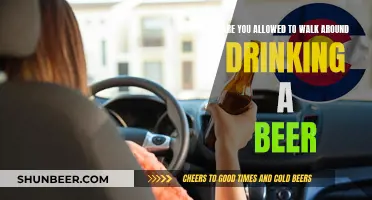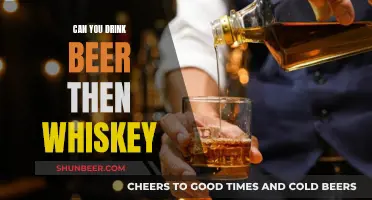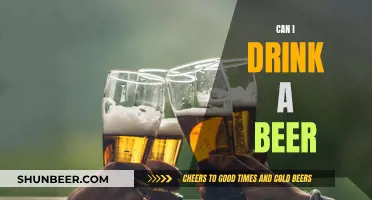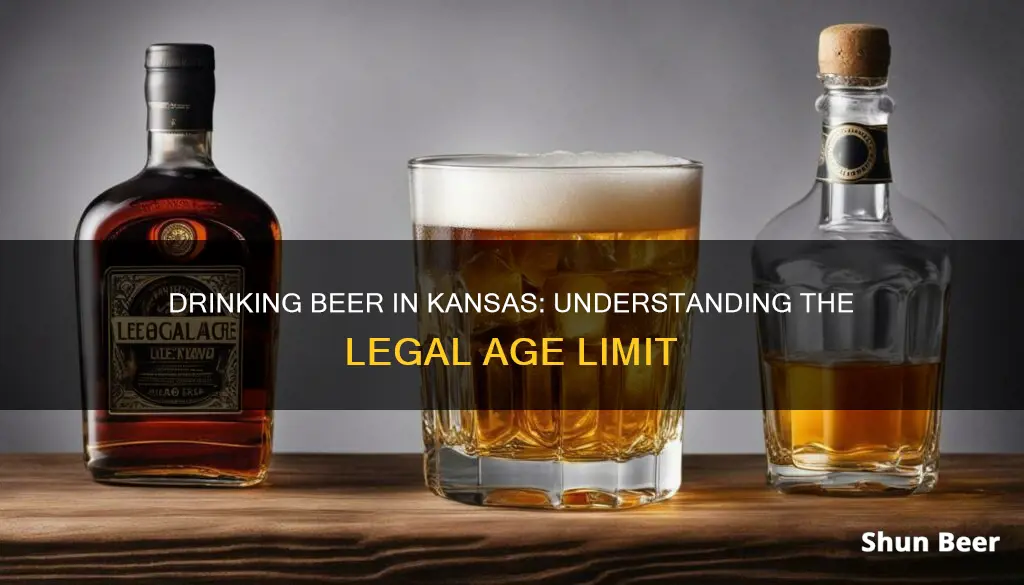
Kansas has some of the strictest alcohol laws in the United States. The legal drinking age in the state is 21, and it is illegal for anyone under this age to possess, consume, obtain, or purchase alcohol. However, there is an exception in Kansas law that permits those under 21 to drink 3.2% beer if it is provided and supervised by their legal parent or guardian. This exemption does not apply to liquor store beer or hard liquor, and the 3.2% beer must be furnished and consumed in the presence of the parent or guardian.
| Characteristics | Values |
|---|---|
| Legal drinking age in Kansas | 21 |
| Legal age to work as a bartender in Kansas | 21 |
| Legal age to sell hard liquor in a retail store in Kansas | 21 |
| Legal age to work as a server in a restaurant serving alcohol in Kansas | 18 |
| Legal age to sell 3.2% beer in Kansas | 18 |
| Legal age to drink beer in Kansas if a parent or guardian provides it and supervises the minor | Under 21 |
| Legal blood-alcohol content (BAC) level in Kansas | ..08% |
| Maximum blood-alcohol content (BAC) level in Kansas for drivers under the age of 21 | .02% |
What You'll Learn
- Kansas law allows people under 21 to drink 3.2% beer if provided by a parent or guardian
- Kansas has some of the strictest alcohol laws in the US
- Kansas had statewide prohibition from 1881 to 1948
- Kansas's maximum blood alcohol level for driving is .08% for adults over 21
- Kansas has a three-tier liquor distribution system

Kansas law allows people under 21 to drink 3.2% beer if provided by a parent or guardian
Kansas has some of the strictest alcohol laws in the United States. The legal drinking age in the state is 21, and it is illegal for anyone under that age to possess, consume, obtain, or purchase alcoholic liquor or cereal malt beverages. However, there is an exemption in Kansas law that allows people under 21 to drink 3.2% beer if it is provided and supervised by a parent or guardian.
This exemption, added to the books in 1992, permits the parent or guardian of a minor to provide them with what is known as a "cereal malt beverage" – a beer that contains no more than 3.2% alcohol by volume. This exemption was the result of lobbying by a group that wanted to allow 18- to 20-year-old college students to be able to share a drink with their parents. The exemption was further clarified in 2004, specifying that the 3.2% beer must be furnished by and consumed in the presence of the parent or guardian.
While this exemption does allow for minors to drink 3.2% beer under parental supervision, it is important to note that Kansas law still prohibits the possession, consumption, and purchase of alcohol by those under 21 in most cases. The state takes a strict and highly regulated approach to alcohol due to its long history of prohibition, which lasted from 1881 to 1948 – the longest of any state. Even after prohibition ended, Kansas continued to prohibit general on-premises liquor sales until 1987.
Today, Kansas law divides alcohol into six categories, each with its own regulations. "Alcoholic liquor" includes spirits, wine, and beer containing over 3.2% alcohol by weight, while a "cereal malt beverage" is defined as beer containing 3.2% or less alcohol by weight. The state also has strict open container laws, prohibiting open containers of alcohol in public places and vehicles, with some exceptions for events with permits and designated common consumption areas.
How Long Does Beer Last Once Opened?
You may want to see also

Kansas has some of the strictest alcohol laws in the US
Kansas's alcohol laws are enforced by the Kansas Division of Alcoholic Beverage Control. The state has a three-tier liquor distribution system, where alcohol is distributed from the manufacturer to the distributor to the retailer. There are some exceptions to this system, such as farm wineries and microbreweries, which are allowed to sell directly to consumers.
The state has strict regulations for liquor sales, which are only allowed in licensed liquor stores. Grocery stores and gas stations are only permitted to sell cereal malt beverages (CMB), which are defined as beer containing less than 3.2% alcohol by weight. Retail liquor stores have strict licensing requirements, including citizenship and residency requirements, as well as restrictions on the types of products they can sell and the locations where they can operate.
Kansas also has strict laws regarding the service of alcohol. Employees must be at least 21 years old to sell alcoholic liquors, while those who are 18 years old can sell CMB in certain licensed establishments. The state also has strict open container laws, prohibiting open containers of alcohol in vehicles, except for limousines and mass transit vehicles.
In addition, Kansas has a high blood alcohol limit for driving, with a maximum limit of .08% for adults over 21 and .02% for adults under 21 and minors. The state also has strict penalties for DUI, including license suspension and fines.
While the state has made some changes to loosen alcohol restrictions in recent years, such as allowing happy-hour specials and direct-to-consumer shipping, Kansas continues to have some of the strictest alcohol laws in the country.
Beer Butt Chicken: Does It Work?
You may want to see also

Kansas had statewide prohibition from 1881 to 1948
Kansas had a long history of strict alcohol laws, and was the first state in the US to enact a constitutional prohibition on alcohol. The state had a strong temperance movement in the 19th century, bolstered by the influence of Puritan immigrants, the association of saloons with negative social and moral effects, and the alignment of the movement with the abolitionist cause.
The state's first temperance organisation, the Independent Order of Good Templars, was founded in the 1850s. After the Civil War, the Kansas State Temperance Union (KSTU) and the Woman's Christian Temperance Union (WCTU) joined the fight for prohibition. In 1878, the movement was well-organised and had influence throughout the state. Supporters staged the first National Temperance Camp Meeting in Bismarck Grove, near Lawrence, which lasted 12 days.
In 1878, voters elected Republican prohibitionist John St. John as governor. In his inaugural address, he called for decisive action to deal with the liquor issue. The legislature responded by passing a constitutional amendment prohibiting the manufacture and sale of "intoxicating liquors" in the state. It was ratified by a majority of voters in November 1880, and the law came into effect on 1st January 1881.
However, the law was not effectively enforced. Saloon proprietors kept their businesses open by paying monthly fines, and loopholes in the legislation led to an increase in the number of saloons in some towns. The temperance movement declined in the 1890s but regained momentum at the turn of the century, attracting support from progressive reformers.
Radical prohibitionists, led by Carry A. Nation, took matters into their own hands. In 1900, Nation began a campaign that attracted national attention. She smashed saloons with rocks and hatchets, enduring ridicule, arrest, and jail to promote the cause. In 1907, the government began to enforce the prohibition laws more effectively, and the governor and legislature strengthened the statutes.
In 1917, Kansas took the final step towards "real and effective prohibition" by passing the \"bone dry\" bill, which made it unlawful for anyone to possess intoxicating liquors for personal use. The lone exception was communion wine. In 1919, the Eighteenth Amendment to the US Constitution made prohibition federal law. However, by the 1930s, most citizens believed that prohibition had failed, and the amendment was repealed in 1933.
Kansas, however, maintained its statewide ban on alcohol until 1948, when voters rejected prohibition by a significant margin. The state then returned to local option laws, which allowed counties and cities to decide whether to permit alcohol sales.
Mixing Beer and Hard Liquor: Safe or Not?
You may want to see also

Kansas's maximum blood alcohol level for driving is .08% for adults over 21
In the state of Kansas, it is illegal for anyone under the age of 21 to possess, consume, obtain, or purchase alcoholic liquor or cereal malt beverages, except in certain situations. One such exception is that persons under 21 may drink 3.2% beer if it is provided by their legal parent or guardian, and they are supervised while drinking. This exemption does not include liquor store beer or hard liquor.
Kansas's maximum blood alcohol level for driving is .08% for persons over the age of 21. This is the standard limit for driving under the influence (DUI) in the United States. If a driver is found to have a BAC level above this limit, they are considered 'per se intoxicated', and no further evidence is required to convict them of DUI.
Kansas has strict laws regarding drinking and driving, especially for those under the legal drinking age. The state has a zero-tolerance policy, with a maximum BAC limit of .02% for drivers under 21. If a driver under 21 is found to have a BAC level of .02% or higher, they are subject to DUI penalties, which can include license suspension and, in the case of a third conviction, DUI is considered a felony.
Kansas's approach to alcohol regulation is influenced by its history of prohibition, which lasted from 1881 to 1948, longer than any other state. Even after prohibition ended, Kansas continued to prohibit general on-premises liquor sales until 1987. The state's strict alcohol laws are also shaped by the temperance movement of the 19th century, which was particularly strong in Kansas due to the presence of Puritans and the association between the temperance and abolitionist movements.
Today, Kansas's alcohol laws remain highly regulated and are among the strictest in the United States. The sale and consumption of alcohol are governed by the Kansas Liquor Control Act, enforced by the Kansas Division of Alcoholic Beverage Control. The legal drinking age is 21, and only those over 21 can work as bartenders or sell hard liquor in retail stores. However, individuals as young as 18 can work as servers in restaurants serving alcohol and can sell 3.2% beer.
Plato's Beer: The Science Behind It
You may want to see also

Kansas has a three-tier liquor distribution system
In the state of Kansas, the legal drinking age is 21. However, there is an exemption in the Kansas statutes that allows people under 21 to drink 3.2 beer or cereal malt beverages (CMB) if they are furnished and supervised by their legal parent or guardian. This exemption does not apply to liquor store beer or hard liquor.
Kansas has a strict and highly regulated approach to alcohol, with a history of prohibition that lasted from 1881 to 1948, longer than any other state. Even after prohibition ended, Kansas continued to prohibit general on-premises liquor sales until 1987.
Today, Kansas has a three-tier liquor distribution system. This means that alcohol subject to control is distributed in three tiers: from manufacturer to distributor, and then from distributor to retailer. This system is designed to regulate the sale and taxation of alcohol in the state. The only exceptions to this system are that farm wineries and microbreweries may sell directly to consumers, and establishments may purchase beer and bulk wine directly from wholesalers.
The three-tier system also applies to retail liquor stores and CMB retailers. Retail liquor stores are licensed by the state and can sell beer, wine, spirits, and non-alcoholic malt beverages. They must be located in a commercially zoned area and cannot be within 200 feet of a school, college, or church. Employees of retail liquor stores must be at least 21 years old, and sales are prohibited between 11:00 PM and 9:00 AM.
CMB retailers, on the other hand, are licensed by the city or county and can sell CMB or non-alcoholic malt beverages. Employees of CMB retailers must be at least 18 years old, and sales are prohibited between midnight and 6:00 AM.
Fitbit Beers: Compatible with Pixel 2?
You may want to see also
Frequently asked questions
No, you must be 21 to drink beer in Kansas.
Yes, there is an exemption in Kansas law that allows people under 21 to drink 3.2% beer if it is provided by their parent or guardian and they are supervised while drinking.
Kansas has strict open container laws. Drinking beer or other alcoholic beverages in public is prohibited unless there is an event with a permit that allows visitors to carry and drink alcohol.
The maximum legal blood alcohol content (BAC) level in Kansas is 0.08%. For drivers under the age of 21, a BAC of 0.02% or more is considered DUI (driving under the influence).


